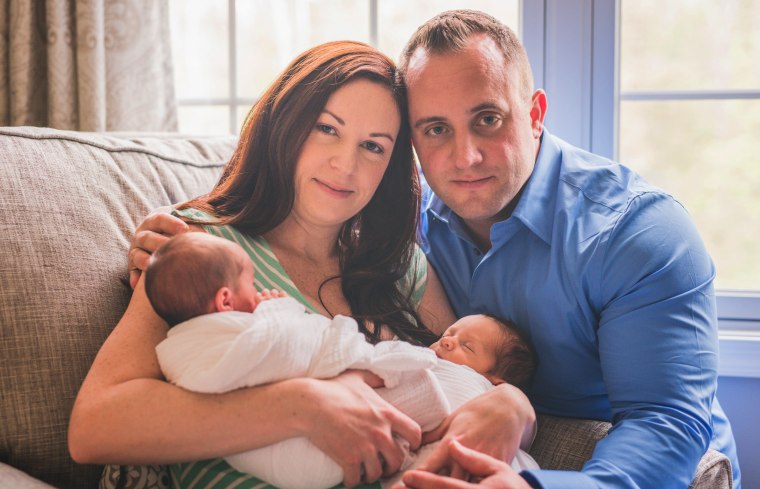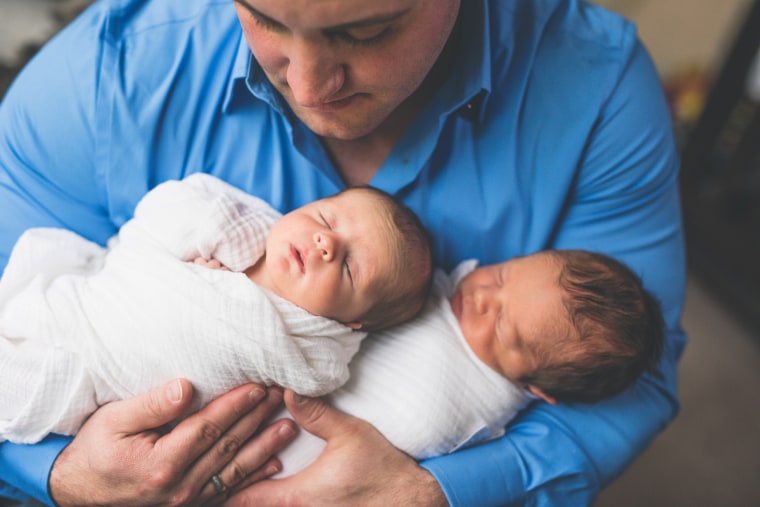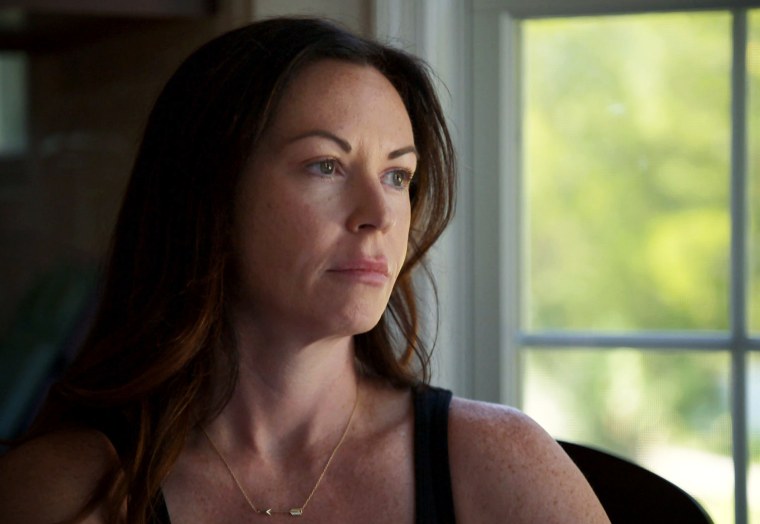MEDFORD, N.J. — It's been three years since the sound of a gunshot shattered April Scherzer's life.
"Every day I wake up, I start from that," Scherzer, 38, said. "My day begins with that gunshot. I relive all of that, all over again, up until now, up until this present moment."
It was past midnight when she heard it. She was nestled in bed with her four-and-a-half-month-old twins, at the home she shared with her husband, Max Scherzer. It was the last place she'd expect to find tragedy.
She ran downstairs and discovered Max in their living room, moments after he ended his life with his service weapon.
Max was just 36 years old and had spent 12 years working as a police officer for the Westampton Township Police Department in New Jersey, a rural community about 40 minutes outside Philadelphia. For several of those years, he struggled to cope with depression, substance abuse and the effects of trauma so often experienced by police officers and other first responders.
"We hold our police officers up to such a high standard," Scherzer said. "Why don't we take better care of them?"
In the wake of her husband's death, Scherzer received little, if any, emotional or financial support that other widows of deceased police officers normally receive. There was no flag given to her at his funeral. He was not honored with any kind of memorial. Max died on the morning of Aug. 21, 2016. She and her children lost their health insurance by October.
"It was another kind of loss," Scherzer said. "The first thing you get when you marry a police officer is the blue family. You become part of that group. And I felt like after Max killed himself that me and the kids kind of got kicked out of that police family."
Every year, more police officers die by suicide than in the line of duty. No federal agency keeps statistics, but according to the non-profit Blue HELP, at least 175 police officers have died by suicide this year.
While both police departments and government agencies across the country are increasingly acknowledging the growing mental health crisis among police officers and first responders, and implementing programming and legislation as a result, less attention is paid to the families, and spouses, who are left behind.
"Too many people take that stigma to heart and that stigma then passes on to the family, when it's not the family's fault," said Karen Solomon, president of Blue HELP. "They shouldn't be penalized. They shouldn't suffer."
'Am I going to have a job?'
Max loved being around people. Most of all, April Scherzer said, he loved helping people.
"When he could help someone, he always did," Scherzer said. "He was just so sweet and kind. He loved me so much. And I loved him. He was my best friend."
He started his career eager to put the uniform on every day. Throughout his 12 years of service, he worked patrol, as an undercover narcotics officer and a school resource officer. But the job began to tear at Max, and as the years passed, he began to depend increasingly on alcohol to cope with his feelings.

Scherzer said that every few months, when Max would experience something traumatic or triggering at work, he would spiral into a depression and drink. He'd call in sick. He'd isolate himself.
But the last thing Max wanted, Scherzer said, was to ask for help from his department. Once, she said, when he admitted to his department that he had a drinking problem, he was sent home for 30 days without any resources or direction toward treatment options.
"He didn't feel that he could go to them to ask for help," Scherzer said. "He was worried that everyone would find out. He was worried what everyone would think of him. And he was worried that he would lose his job if he said that he was, you know, having issues with post-traumatic stress or his drinking."
One particular incident stayed with Max. While working overnight in the middle of winter, he got a call that a man crashed his pickup into a tree. He was the first officer on the scene. When he arrived, the truck was engulfed in flames. Max struggled to pull the man out of the truck, but he couldn't.
All he could do was stand back and watch helplessly as the man burned alive.
The flashbacks and nightmares started soon after that, and his drinking accelerated. Scherzer tried her best to help him but often, she said, she felt lost.
"I didn't know anything about any employee resources," she said. "It's not like when you marry a police officer they give you a manual that says, 'These are the signs to look out for. And this is what you should do when.'"
"I just tried to make the other parts of his life the best I possibly could," she added. "I know he loved his job. But I know sometimes he didn't want to go in. And he didn't want to see those things."
Shortly before Max died, he attended a seminar and heard a therapist speak about post-traumatic stress disorder and other mental health conditions that affect first responders. Her talk resonated with Max. Afterward, Scherzer said, he reached out to the sergeant who organized the seminar and asked for the therapist's number.
Scherzer said that when the department learned he had requested to speak to the therapist, they confiscated his gun, sent him home for 30 days, and told him that a department-affiliated therapist would have to clear him to return for duty.
"During that 30 days Max just drank," Scherzer said. "He was the entire time worried, you know, 'Am I going to have a job? What are we going to do?'"
Her husband was "devastated," Scherzer added.

"He just sat at home waiting for them to tell him what the next step was," she said. "When he did return, he said all of the other officers knew that he had asked for this woman's phone number. Everybody knew his business. And he felt like everybody was looking at him like he was, you know, this mentally unstable person when he wasn't."
Westampton Township Police Chief Stephen Ent said he couldn't comment on Max's case, but said that his death was a "tragic loss" for the department.
"Max was one of those people," Chief Ent said. "Everybody loved him."
'Zero. See you later. Bye'
Families of police officers who die in the line of duty typically receive an outpouring of emotional support from their police departments and community. Those departments, and states, also provide financial assistance to spouses and families, including death benefits, health insurance and scholarships.
That's rarely the case for families whose loved ones die by suicide.
After Max died, Scherzer and her twins, Max and Molly, were left alone to mourn. A home that often hosted fellow police officers and their families stood largely silent. Her phone stopped ringing. As the days passed, her hope that Max's colleagues would circle around her dimmed.
"It's almost like being a cancer that everyone thinks is contagious," Scherzer said.
It was at her husband's funeral, when she didn't receive a folded American flag, that she first felt the inkling that she was different from other police widows.
"I just remember sitting there at the funeral home as everyone left and just sitting there feeling very, very alone and empty and not sure what was going to happen, what I was going to do," she said.
The isolation Scherzer experienced compounded her grief. But there were practical matters to attend to, as well, including the question of how she was going to care for herself and her infant children. She had no idea how she was going to make ends meet.
Some kind of financial assistance would have helped. But in the state of New Jersey, as in other states, Scherzer was not entitled to death benefits because her husband died of suicide, which is not considered a line of duty death.
Months before Max's death, a state trooper with two years on the job was killed in an accident. But because he wasn't married to his fiancée, their children were not entitled to full death benefits. The case pushed legislators to act.
In August 2016, the same month Max died, Gov. Chris Christie signed a law that extended death benefits to minor children of all police, firefighters and other first responders killed in the line of duty, regardless of their parents' marriage status.
Neither Scherzer, nor her twins, qualify for those benefits.
In October, Scherzer learned her health insurance had been terminated after she rushed her daughter Molly to the emergency room with a fever.
"It felt like I had been kicked in the stomach again," Scherzer said. "I didn't know what I was going to do."
Scherzer scoured the internet for resources, turning to several national organizations that help families of officers who have died in the line of duty.
She explained she needed help. "I was told basically that there was nothing that they could do because my husband's death did not qualify," she said.
"Nobody helped me navigate through all the different aspects I had to go through," she added. "It's hard to keep getting turned down and turned away. It's almost dehumanizing."
"We are very selective about who we consider to be heroes in death," Solomon, president of Blue HELP, said. "We tout this blue family concept all the time. What kind of family turns their back on you in the moment you need it the most, because you don't believe in the way somebody died?"
More often than not, for families left behind by suicide, Solomon said, there are no memorials. No honors. And no help.
"They get nothing," Solomon said. "Zero. See you later. Bye."
Scherzer often has to drive past a memorial that honors fallen police officers from the area. But her husband's name isn't on it.
As a single mom, she struggles to find time to take care of herself in between raising the twins.
She worries that they'll never know about what a kind person he was. About all the good he did. There are few people around, besides herself, to tell those stories.
"There's all these great things he did when he was a police officer," she said. "But nobody ever wants to talk about that."
The focus, she added, is on "the way he died. Not the way he lived."

